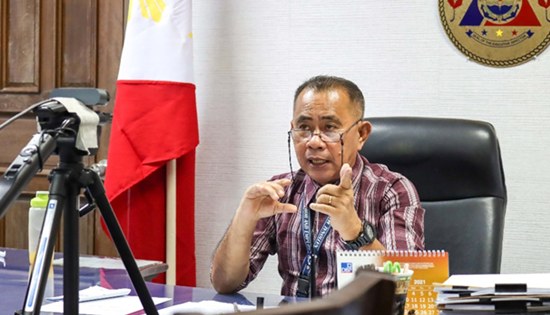NMP supports
MARINA’s proposed shift in the maritime education and training

NMP
Executive Director III Joel B. Maglunsod expresses support to
MARINA. |
By
National Maritime
Polytechnic
November 27, 2021
TACLOBAN CITY – The
National Maritime Polytechnic (NMP), upholding its commitment being
the sole government-owned maritime training and research institution
in the country supports the initiative of the Maritime Industry
Authority (MARINA) on the proposed enhanced curriculum
standardization for the maritime degree programs, and recommend to
put-off the Onboard Training (OBT) after graduation.
MARINA is eyeing that the
students of the Bachelor of Science in Marine Transportation (BSMT)
and Bachelor of Science in Marine Engineering (BSMarE) will finish
first the 4-year program and graduate, then begin the one-year OBT
under Marina's supervision, after graduation. Upon completion of the
12 months, they will be issued their Certificate of Competency (COC)
by the Maritime Administration.
NMP believes that the
proposed revamp of MARINA is an effective strategy to improve the
maritime education curriculum and will aid to fully equip our
aspiring seafarers by providing them with sufficient knowledge and
skills through updated teaching materials and supplement extensive
laboratory and simulation trainings prior to their exposure to the
real-world.
In one of NMP’s research
study completed in 2019 on the Capacity of the Philippine Maritime
Industry to Produce Officers in Charge Per STCW Requirements: Focus
on the Onboard Training of Cadets, revealed the struggle of Maritime
Higher Education Institutions (MHEIs) to deploy their cadets and
attain the deployment rate required by regulatory bodies, due to the
inadequate number of domestic ships qualified for OBT of cadets, and
the limited availability of oceangoing vessels that accept cadets
for OBT, among others.
The lack of training
berths available for cadets eventually lead to the low turnout of
maritime graduates and redound to lesser number of merchant marine
officers. Considering that this is a global concern, the lack of
training berths for both domestic and international fleets should be
addressed not only by the MHEIs but by the maritime industry as a
whole.
The Philippines, being the
apex supplier of seafarers globally, needs to develop highly
competent officers for both domestic and international voyages and
withstand various challenges at sea.
As an integral part in the
growth of the maritime industry, NMP in accordance with its mandate
is committed to provide any means of assistance to strengthen the
shipboard capabilities of the maritime fleet.